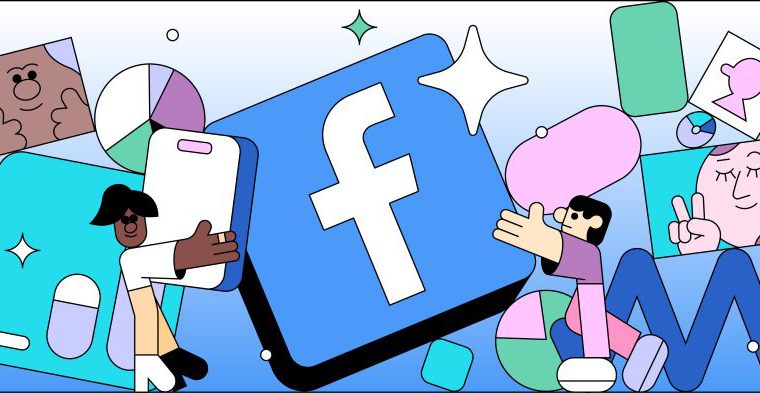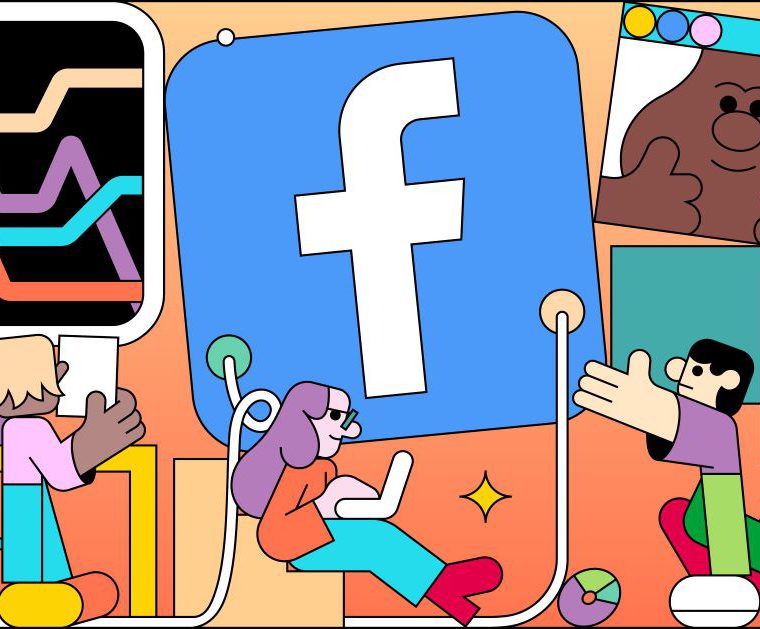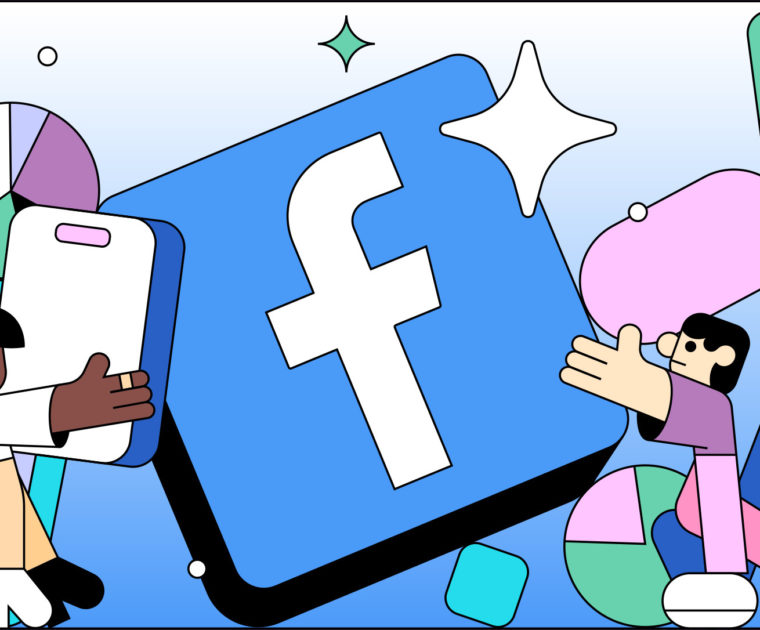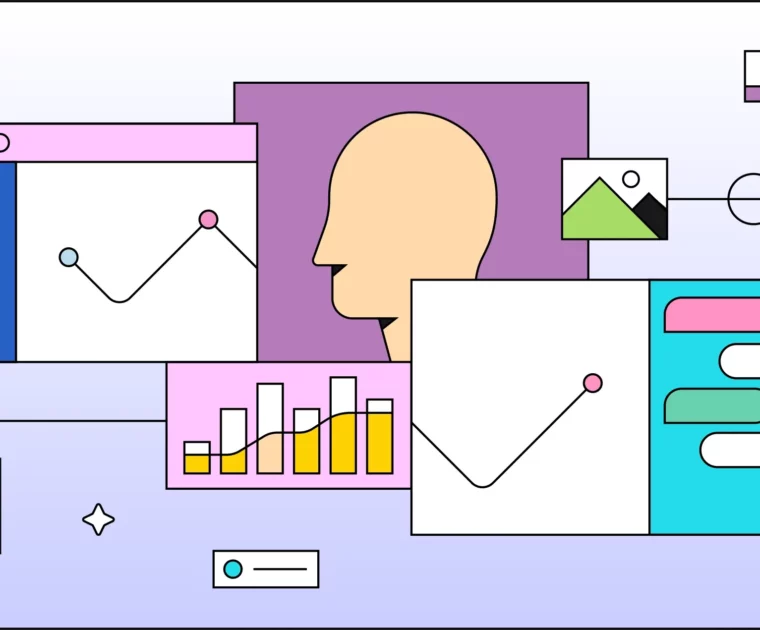When deciding where to spend your precious marketing budget, you may find yourself weighing Facebook ads vs influencer marketing. We’ve been there, too. That’s why we created this post to give you all the nitty gritty details on both strategies so you can decide which is best for you.
Facebook ad revenue is expected to hit $153.76 billion in 2023. The valuation of the entire influencer marketing industry in 2023 is $21.1 billion. It’s no wonder choosing between these two methods of advertising isn’t easy!
If you’re stuck at a fork in the road trying to choose between the two, no worries. You’re in good company. In this post, we’ll help you decide the best path for your brand to take as we explore Facebook ads vs influencer marketing. We’ll discuss the key similarities and differences to help you navigate your way through this decision.
This post aims to create a roadmap to answer the questions: What are the differences between Facebook ads and influencer marketing? What are the pros and cons of Facebook ads vs traditional marketing? And are you ready to use all of the above to ramp up your strategy?
Let’s start with Facebook ads.
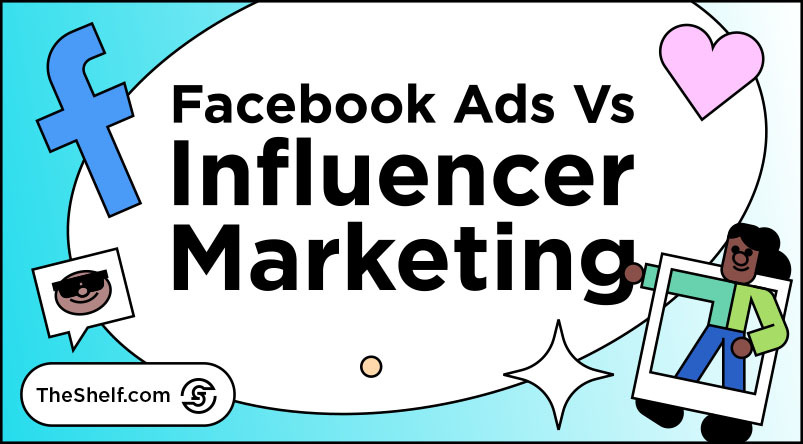
Facebook Ads: Knowing The Basics
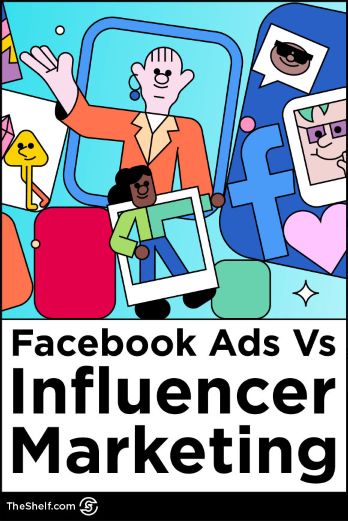
If you’ve spent any time on Facebook, you’ve seen Facebook ads. These targeted ads pop up on your feed with such accuracy that you wonder whether Meta is listening to your conversations. It’s almost like walking into a shopping mall and every product on the shelf is tailored just for you. So spot-on that it’s creepy. But how does it all work?
Facebook ads now offer tons of different options. Brands can promote pages, posts, websites, and even the actions users take. Ad format options are also expanding with new additions like Instant Experience. This lets people watch videos, look through tagged images, carousels, and product catalogs, and visit other web pages.
Targeted Reach
Facebook ads allow brands to target specific demographics, interests, and behaviors. Want to reach dog dads in Omaha aged 25-34 with an affinity for baking? You can do that! Some marketers consider Facebook’s targeting capabilities to be one of its greatest strengths since they work well with any business strategy. And a lot of these capabilities are only available on Meta’s platforms.
Data-Driven Approach
Within Facebook’s sophisticated ad system, Like, click, and share actions produce specific data brands can study this data to understand what works and what doesn’t. It’s 2023, and data makes the world go ’round. Sprout Social reports that 77 percent of marketers use it for their retargeting efforts, harnessing the power of data to reconnect with potential customers to increase the success of their Facebook ads and Instagram ads marketing strategies.
Cost-Effective
Think Facebook ads are expensive? Here’s a hack: With Facebook ads, timing is everything. An ad for glazed ham may cost significantly more during the holidays than it will over the summer. With options to set your budget and bid for ad space, it’s a cost-effective way to reach audiences as brands can specify a budget, and automatically bid on ad placement.
Measurable Results
Facebook ads always provide a detailed analysis to let your brands know how successful their campaigns are. Although Instagram has proven to be the platform with the best ROI, it is tied with Facebook on engagement and quality leads.
Creative Freedom
Videos, carousels, Instant Experience, and more. Again, Facebook ads offers a ton of creative marketing tools to showcase the value proposition of your brand. It’s a playground for creativity, and SproutSocial points out that 65 percent of consumers say they feel more connected to brands with a strong social presence.
Facebook ads provide a versatile platform for creative expression, but there’s another marketing strategy that has the advantage of the human element. Let’s take a look at influencer marketing, where authenticity and personal connection take center stage.
Influencer Marketing Essential Elements
Influencer marketing is more than just trendy buzzwords. This is where data meets relationships, and it’s the perfect marriage. Let’s look at what makes this combination so magical.
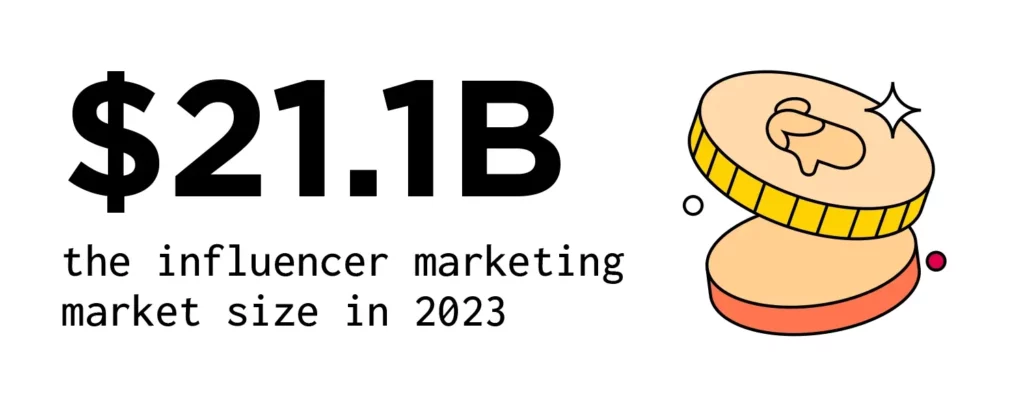
Human Connection
The best thing about influencer marketing is….well, the people! This kind of marketing is all about connecting with your audience through interaction with real people (usually). AI influencers are on the rise, but that’s another post. This one, as a matter of fact. 😉
Influencers, whether they’re computer-generated, celebrities, or micro-influencers, have a following that trusts them. It’s like having a friend recommend a product to you. This is why 81 percent of consumers say social media posts drove their interest in items or services within the past year, not traditional advertising.
Authentic Engagement
I can remember when Oprah Winfrey would recommend a book and it would become an instant best-seller. Now, Khaby Lame has the same effect on his generation — just by making a face. Influencers have always had a unique way of connecting with their audience, making their recommendations feel genuine and personal, even without speaking a word. Now that’s influence!
Reaching Niche Markets
Influencers generally serve a specific niche. Whether it’s fitness, fashion, or finance, brands would be wise to tap into these niches to reach their targeted audience. Using niche marketing strategies can help to catapult growth to new levels
During the Covid-19 lockdowns, my son saw a kidfluencer playing Roblox on YouTube. Since then, he’s convinced his dad and me to buy a game console, approximately a kuh-billion dollars in Robux, merch including backpacks, underwear, and posters, and he made us sit through the movie.
I noticed that he’s also shown his cousins (local and out-of-state) how to log on and play with him. We’ve even had a few family sessions (which I’ve thoroughly enjoyed). All this because his favorite kidfluencer recommended it. He’s been a loyal player ever since!
Measurable Impact
Anything worth doing is worth doing well. Like Facebook ads, influencer marketing offers measurable results. Brands can track key performance indicators (KPIs) like engagement, click-through rates, conversions, and impressions to determine the success of a campaign.
Creative Collaboration
Consumers are constantly bombarded by ads, so influencer marketing can be a breath of fresh air. Influencers have an advantage over algorithms in that they bring creativity to the table. They know their audience and they understand how to create relatable content that resonates. The collaborative effort between the brand and the influencer is what leads to engaging, innovative, and effective campaigns.
Facebook Ads Vs Influencer Marketing: Which is Better?
Let me tell you about the Tale of the Tape. It’s Tiiiime (in my Bruce Buffer voice)!
Introducing first in the blue corner: Facebook ads, the tech-savvy algorithm-driven, surprisingly accurate, semi-creepy powerhouse! And in the red corner: influencer marketing the relatable, consumer-centric, paradigm shifter. Here’s a look at the Tale of the Tape:
Reach and Targeting
Facebook ads can reach a mind-blowing 2.08 billion users and are laser-focused on targeting. It’s estimated that there are 4.9 billion users of social media worldwide. Influencer marketing has the potential to reach every one of these users by offering a niche-heavy approach, connecting with specific audiences with the help of the personalities their audiences have come to love and trust.
Trust & Authenticity
Here’s where influencer marketing shines. 62 percent of consumers trust influencers more than brands or celebrities. That trust translates into engagement, loyalty, and customer retention. Facebook ads, while great at targeting, may lack the personal touch that consumers have come to crave, and even expect.
Cost & ROI
Facebook is not only the most-used social network. It also offers the highest ROI. Influencer marketing can vary widely in cost, depending on the influencer’s reach and engagement rates. On average though, businesses can expect to produce $5.20 per dollar spent on influencer marketing.
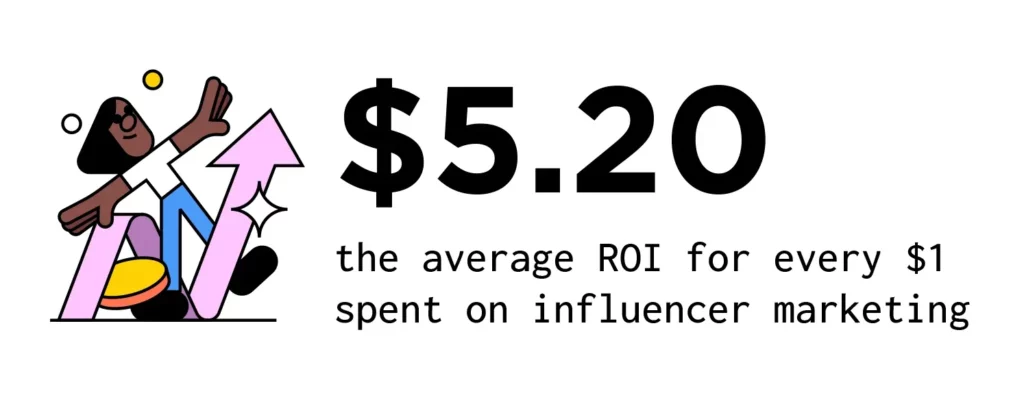
Creativity & Collaboration
Both strategies offer a bit of creative freedom, but influencer marketing adds the bonus of collaboration. Think of it this way: Queen is dope. But “Under Pressure” would not have been the banger that it is without David Bowie.
Get my drift? Collabs take everything to the next level — usually resulting in a harmonious blend of brand and influencer creativity.
Measurability
Both Facebook ads and influencer marketing give brands the ability to measure success. They can see what works and capitalize on any opportunities to make improvements as they see fit.
Trends & Adaptability
Influencer marketing is people-driven. People by nature have to be great at adapting. It’s essential to our survival. Influencer marketing is adaptable and also in tune with current trends. Facebook ads, being data-driven, can quickly adapt as well as see upcoming trends, and quickly make adjustments to be ready for market changes before they occur.
Facebook Ads vs Traditional Ads
Let’s not forget the OG of the marketing game: traditional ads. How do they compare?
Well, they’re different — really different. Sure, they have the same purpose. They aim to let potential customers know about a product or service, make sure they remember it, and persuade them to consume it. But traditional advertising, with its print media, radio, and TV ads, is prone to missing the mark on personal relevance. It often lacks the real-time responsiveness of its digital counterpart.
Facebook ads are dynamic and do a great job determining and reaching the brand’s targeted audience. The ability to optimize messages and visuals quickly and in real-time not only makes social media advertising more effective but also more cost-efficient.
Statistics prove that more than 60 percent of marketers expect their influencer budgets to increase while many are foregoing traditional marketing altogether. A marketer’s goal isn’t simply to reach people. It’s to connect with the right people at the right time, in a way that traditional advertising historically has been unable to do.
So, Facebook ads vs influencer marketing: Which is better?
We’ve covered the differences, similarities, and pros and cons of Facebook ads, influencer marketing, and traditional marketing. We see how each method can be accompanied by unique opportunities and challenges. So who wins this bout? It’s not exactly a one-size-fits-all answer. There are tons of variables to consider. It depends on your brand, your audience, and your goals. Facebook ads offer a wide reach and precise targeting, while influencer marketing builds trust and engagement.
The right choice for your brand depends on your specific goals and target audience. Think of it like choosing between a classic black dress and a trendy new outfit. Both have their place and purpose. The key is understanding when and how to use them.
Whether you’re looking to expand your reach with Facebook’s targeted ads, build trust through authentic influencer connections, or explore a blend of both, you can count on the geeks here at The Shelf to point you in the right direction. Ready to take the next step and find the perfect strategy for your brand? Great! Schedule a strategy call, and let’s find your brand’s voice, and get it out there.

ABOUT THE AUTHOR
Lira Stone | Effective, Magnetic Strategist
For over a decade, my focus has been ensuring that professionals stay ahead of the curve in the most time-efficient, task-prioritized, and stress-free manner possible. My extensive experience has equipped me with the knowledge to design a concise, company-culture-relevant, methodical approach to internet sales and marketing.



